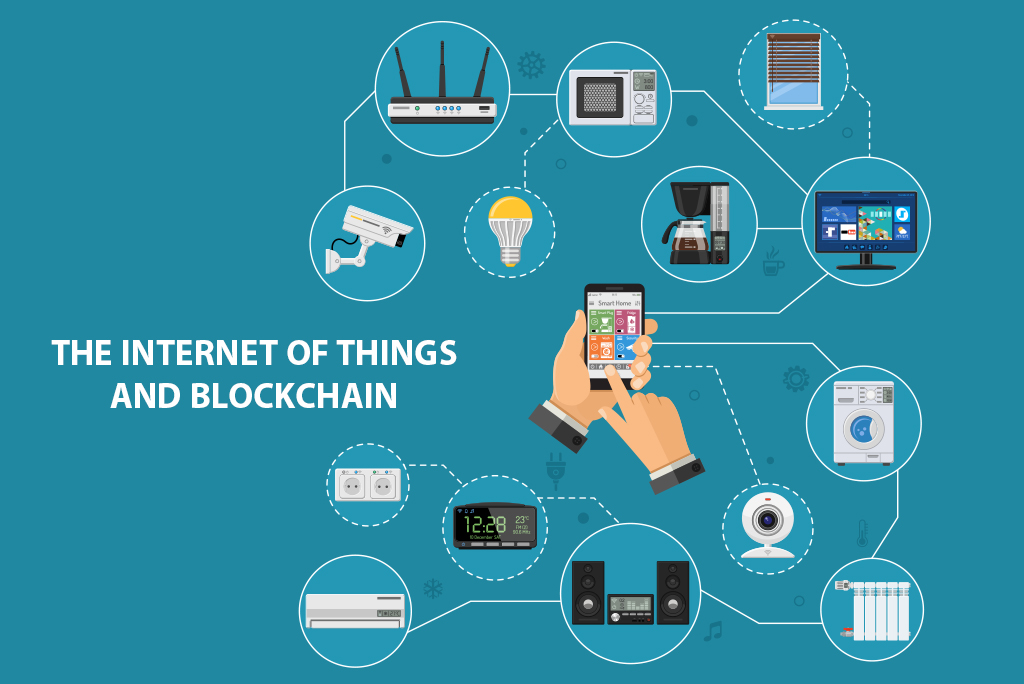
Earlier last month, Zion Market Research estimated that the global blockchain Internet of Things (IoT) market will become a three billion dollar industry by 2025. Worth $32 million (USD) in 2018, the report puts the industry at a 91% growth rate. As an increasing number of businesses invest in IoT to connect and share data, company leaders are recognizing the potential of blockchain technology to ensure the transfer of information is secure.
Benefits of Blockchain and IoT
Because the IoT device market is still largely unregulated, security is one of the biggest concerns regarding IoT. Such security issues include the inability to identify compromised devices, data leaks, and hackers controlling devices remotely. According to Gemalto, a digital security firm, less than half of IoT businesses can detect if any of their devices have been breached.
Blockchain’s distributed ledger technology could protect against data tampering. Furthermore, if information is shared through smart contracts over a decentralized and cryptographically secure blockchain network, devices can have increased autonomous functions. Instead of requiring third-parties to continually monitor and authenticate every micro-transaction between devices, the IoT system will be able to operate more quickly.
Blockchain could also be leveraged to combat hackers by shutting down compromised devices in an IoT network.
Blockchain, Not Yet a Silver Bullet
As an emerging technology, there are still organizations that are cautious about investing too heavily in blockchain. Although 91% of IoT companies that don’t currently use blockchain reported to Gemalto that they were likely to consider it in the future, the technology does have limitations.
Obstacles to blockchain adoption include:
- Trust: As mentioned, blockchain is a relatively new field. While some companies have launched pilot programs to study various blockchain applications, there aren’t years of data to study and use as proof points. Not only is trust in the technology itself a potential problem, but there also must be a certain level of trust among companies that decide to pursue joint-blockchain ventures.
- Organization: When setting up a blockchain program, many factors need to be taken into account during the implementation process. Often, it’s not as simple as tracking the location of a product. The condition of the goods—for example, the temperature of perishable food— is also critical data to monitor. Researchers need to think through how this data will be captured, communicated, and controlled.
- Processing Power: Many typical IoT devices don’t have enough processing power to undergo the heavy computational load needed to directly participate in a blockchain. Furthermore, the number of IoT devices is expected to grow rapidly within the next few years. A 2016 report from Statista Research Department projects the total installed base of IoT connected devices to hit more than 75 billion worldwide by 2025. Blockchain networks will need to be able to keep up with the increased volume of data.
Preparing for Blockchain and IoT
Blockchain can improve more than just the Internet of Things. Possible applications include industries such as autonomous vehicles, healthcare, and supply chain. If you’re interested in learning how blockchain could affect your industry, check out Enterprise Blockchain for Healthcare, IoT, Energy, and Supply Chain, a five-course program from IEEE.
To get a license for your organization, contact an IEEE Content Specialist today for more details.
Want the program for yourself? View the courses on the IEEE Learning Network, a new learning management platform!
Resources
(09 August 2019). Global Blockchain IoT Market Will Reach to USD 3,033 Million By 2025. Global Newswire.
Bennett, Martha. (26 July 2019). Many Blockchain Use Cases Need IoT To Succeed. Forrester.
(15 January 2019). Almost half of companies still can’t detect IoT device breaches, reveals Gemalto study. Thales.
Pauw, Chrisjan. (4 December 2018). How Significant Is Blockchain in Internet of Things?. CoinTelegraph.
Compton, Jason. (27 June 2017). How Blockchain Could Revolutionize The Internet Of Things. Forbes.
(27 November 2016). Internet of Things (IoT) connected devices installed base worldwide from 2015 to 2025 (in billions). Statista.


[…] Blockchain is a decentralized digital ledger of transactions that records data in a way that prevents hacking and altering of the data. It does this by duplicating transactions and dispersing them to “nodes” across the […]
[…] chain. Blockchain is a decentralized digital ledger of transactions that records data in a way that prevents hacking and data altercation. Not only will this technology make the supply chain nimbler, faster, and more efficient, it will […]
[…] technology, a decentralized digital ledger of transactions that records data in a way that prevents hacking and data altercation, may be able to help medical professionals, manufacturers, distributors, and patients stay on top […]
[…] post, blockchain is a decentralized digital ledger of transactions that records data in a way that prevents hacking and altering of the data. It does this by duplicating transactions and dispersing them to “nodes” across the […]
[…] discussed in a previous post, blockchain is a decentralized digital ledger of transactions that records data in a way that […]
[…] discussed in a previous post, blockchain is a decentralized digital ledger of transactions that records data in a way that […]
[…] on the blockchain, a decentralized digital ledger of transactions that records data in a way that prevents hacking and altering of data by duplicating transactions and dispersing them to “nodes” across the network. Furthermore, the […]
[…] posts, blockchain is a decentralized digital ledger of transactions that records data in a way that prevents hacking and altering of data by duplicating transactions and dispersing them to “nodes” across the network. Healthcare […]
[…] medicine, blockchain technology is revolutionizing healthcare in a number of ways. As discussed in previous posts, blockchain is a decentralized digital ledger of transactions that records data in a way that […]
[…] discussed in a previous post, blockchain is a decentralized digital ledger of transactions that records data in a way that […]